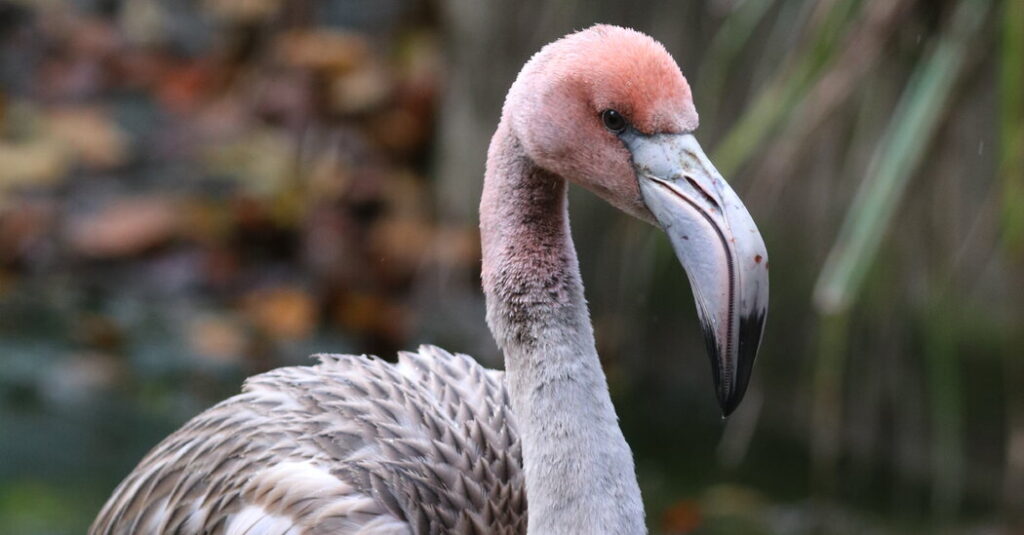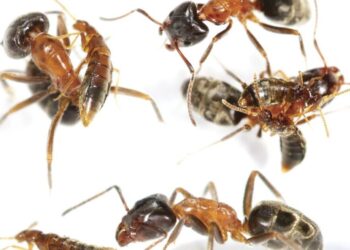As the weather turned cool this autumn across England, Frankie the flamingo had apparently had enough.
On a blustery Sunday morning this month, the juvenile bird vanished from the zoo in Cornwall where she was born. After a frantic six-day search to find her, Frankie’s keepers learned this week that she had traveled roughly 130 miles away — to a beach in France.
Frankie’s journey was exceptional, her keepers said, as she is only a few months old and had a wing clipped, which should have prevented her from ever taking flight.
“Being a young bird, we were quite surprised how quickly she got to France,” said David Woolcock, a curator at the Paradise Park Wildlife Sanctuary, where Frankie lived. “But she’s feeding, she’s preening, she’s having a whale of a time by the look of it.”
Frankie, a four-month-old Caribbean Flamingo whom Mr. Woolcock described as “aloof” and “quite a character,” left the zoo sometime around 8 a.m. on Nov. 2, when a staff member noticed she was missing from her flock.
The details of her escape are still a mystery, but Mr. Woolcock offered a theory: Like most young birds, flamingos are known to jump up and down, stretching and flapping their wings as they get used to them, he said.
“I suspect that what happened was she was in the process of doing that and a gust of wind took her and she was up and away,” he said.
Clipping a bird’s wing can prevent it from taking flight, he added, but it does not prevent them from flying once airborne.
After she was reported missing, the zoo contacted local news media, asking for the public’s help in finding her.
Her keepers followed up on tips across the region, a process that was complicated by the recent release of a White Stork by a conservation group farther north.
“We were getting constant calls — ‘We found the flamingo, it’s here in this field,’” Mr. Woolcock said. “We would drive out there, and it would be the White Stork.”
There was only a single confirmed sighting of Frankie in England — a local resident’s grainy photo of her high in the air — before the trail went cold. The staff worried that she might have hit an air stream that pulled her far out into the Atlantic Ocean.
A breakthrough came on Nov. 9, when a sighting appeared on a French citizen science portal: A flamingo on the Île Aganton, an island on the north coast of France. A pair of images of a flamingo along the coast at Plage de Keremma, about 30 miles away, were later forwarded to the zoo.
The bird had its right wing clipped, just like Frankie.
The sighting on Île Aganton was made on Nov. 3, shortly before 10 a.m., which means Frankie could have made it to France in less than a day.
Now that she’s there, the zoo said it was unlikely it would be able to bring her home.
The United Kingdom’s departure from the European Union has made it difficult to move wild animals across the U.K.-France border. An extra complication, Mr. Woolcock said, was the risk that Frankie may have contracted bird flu on her travels.
“It was never our intention for Frankie to end up in the wild,” the zoo said in a news release, but struck an optimistic tone all the same. “There are a number of reports of similar situations where flamingos have lived for many years and thrived, including over European winters, so while we will continue to worry about her, it is a position we have to accept.”
Mr. Woolcock said the zoo’s staff was “devastated” by the loss of Frankie, only the second flamingo to be born at the zoo and something of a celebrity among visitors.
But he said that she looked healthy in the images sent from France, and he’s hopeful that she will find one of the flocks of wild flamingos in Europe, like the large flock in the Camargue Regional National Park in the south of France.
In the meantime, he said, he was heartened that she had found somewhere suitable to live, that should allow her “to grow a little bit more mature — and hopefully find a partner.”
Jonathan Wolfe is a Times reporter based in London, covering breaking news.
The post On a Clipped Wing, Flamingo Escapes a British Zoo for a Life in France appeared first on New York Times.




